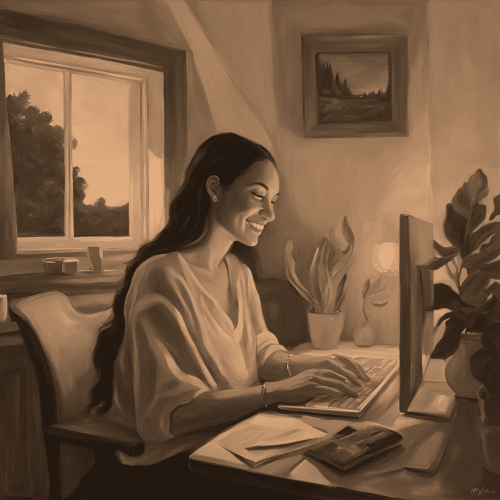Everyone’s on their own journey in life, and one interesting way to think about any particular individual’s journey is by diving into how they change on any one Myers-Briggs (or OCEAN or any other such system) axis changes over time.
In other words, Myers-Briggs might tell you you’re 74% introvert and 26% extrovert. But were you always? Was the younger version of yourself more extroverted? And how will the older version of you likely be?
Your growth as a person–your transformation as a person–can be measured on the classic psychological profile axes. Now that would be interesting to map for anyone, to get to know them; or for yourself, to get to know yourself better.
Let’s take me, for example. An example I know very well, although I’m deeply biased regarding.
I’m a “J” (an “INTJ,” more specifically)–to simplify the last letter in the Myers-Briggs, it is a “J” or a “P” for a particular spectrum of your judginess, to make-up a word: “J” for being judgmental, quick to decide, and “P” for listening, interpreting, thinking before jumping to a conclusion, the opposite of “J”–and, I’ll confess to the world: yes, I do judge others. Too much. Yes, I do think bad things when my I judge something to be bad. Yes, I see stupidity everywhere and yes I do have judgy thoughts, like explicitly thinking this or that is stupid. Likely too often.
But decades ago now–when I was just a kiddy, graduating college–I had some revelations that were deep for me at the time, on the problems of being so, well, judgy to everyone, at all moments, and to thinking I was the greatest thing since sliced bread.
(Yes, I can make it sound like I thought deep thoughts and realized deep things about myself; in reality, it’s just the ups-and-downs of life and its painful parts that I experienced in my 20s–I do have human DNA, after all.)
But a series of events led me to realize I needed to transform myself to be “less J” and “more P.”
How does one go about such a self-transformation?
With time, discipline, and focus.
Some fun examples to share. I realized that the people I enjoyed spending the most time with NEVER responded to anything I said by criticizing it, but by taking anything I said and building on it in a positive–and funny–way. Improv comedy’s “yes, and” from that point on has lived deeply in my heart as a life philosophy, for example and yes, improve comedy classes ought to be mandatory for all humans, the “J” in me wants to mandate.
Here’s something else I did: I watched the entire series of Friends–which I didn’t particularly love, but I don’t hate either; I was always strongly on the Seinfeld side of the Friends vs Seinfeld debate–with no sound and no subtitles. It sounds ridiculous to me today, but–alas!–the crazy things you do when you’re in your low-20-s!
I did it as one of my self-developed processes to teach myself empathy and to understand others, building on my realization at that point that most communication is non-verbal, and people’s words are often–very often–misleading. I needed to understand people beyond trusting my literal interpretation of their words, I realized. To do so, I started employing more my love of “reading between the lines” in literature to humans I interacted with; and I started to look at other clues to understand people, their body language. Say what you want about Joey–but his body language is the most fun to read. And this exercise gave me exponentially more respect for actors than I had had before (remember, as a very strong “J”, I thought everyone was to be looked down on!).
I had many, many less-fun situations that drove me in the same direction. I’ll leave the personal ones for when there’s alcohol involved, but for some work related ones, I had a key work realization in my very low 30s, as I was starting to manage bigger and more complex teams under conditions of ungodly enormous amounts of stress, perhaps even with the risk of life or death of fates of nations being involved. The realization was this: if I judged people too harshly, if I’d talk negatively to them–that would result me turning them off from talking openly to me, and they would never tell me anything I didn’t want to hear. And as a manager, it is fatal if the people you work with avoid telling you bad news. I realized I needed to change myself to be, well, approachable. Hence Joey and my ability now to know almost every episode of Friends but not quite get the intricacies of the plot since, well, reading body language only takes you so far. (Lip-reading is a skill I still haven’t developed.)
But something funny happened on the way to the kabbalistic age of 40: I became so good at the learning the “P” side of things, that it transformed me. I would guess that I went from being a 95/100 “J” (and thus 5/100 “P”) to being 60/100 “J” (and thus 40/100 “P.”) The process of my trying to learn to “perceive” better, my training myself (often painfully) over years to listen and understand people better turned me into someone who actually did listen before judging.
Of the many things I learned in the process, one less-obvious one is: playing the part, for long enough, you turn into the part. Playing a “P” for years and years, has made me into a light P, or at least much more of a “P.” This has deeper implications than just tweaking a minor aspect of your personality. While my example above is a bit deeper, here’s a lighter examples: I know one guy, a bit younger than me, who speaks in a husky voice as though he is a 80-year old lifelong smoker. Why? When he was a little kid, he loved that voice from movie characters, so he started talking that way, *all the time*, as a joke. The family thought it was funny and laughed and didn’t stop him and… over the years, that turned into his ONLY voice.
Another less-obvious lesson: personality profiling yourself, and examining different axes, isn’t only a tool for understanding yourself, they can be a tool for understanding how you’re changing, and to help you change in a positive direction.
So, with that, you might want to have fun by asking yourself questions along the lines of: on the various Myers-Briggs or OCEAN (or personality assessment test of your choice) axes, if you’re interested enough in this subject to read this article, you probably know your own–but think about how you’ve changed. Then think about which ones you would like to change in yourself, for the “20 years in the future” version of you. The results of this exercise might surprise you.







